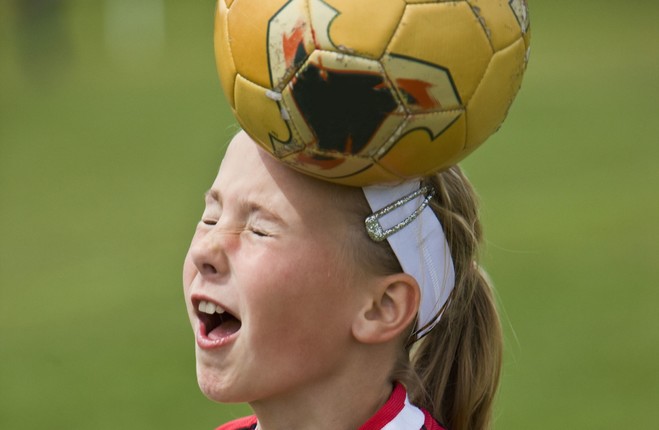LAST UPDATE | 24 Feb 2020
THE FOOTBALL ASSOCIATION of Ireland will monitor the effects of a heading ban in football training for children up to the end of primary school, introduced today with immediate effect in Northern Ireland, England and Scotland.
The three football associations issued a statement on Monday confirming changes to their heading guidance, which come in the wake of the FIELD study which showed former footballers were three-and-a-half times more likely to die of neurodegenerative disease than age-matched members of the general population.
The changes stated there would be no heading at all in the “foundation phase” – primary school children – and a graduated approach to heading in training in U12s to U16s football.
There will be no change in terms of heading in matches, taking into consideration the extremely limited number of headers which actually occur in youth matches.
In light of this development, FAI Interim Deputy CEO Niall Quinn said that the FAI are in discussions with all three associations and Uefa on the matter.
“We are in communication with the football authorities in the UK and with Uefa on this issue”, said Quinn. “The health and safety of our schoolboys and schoolgirls is paramount and we note the decision taken in Northern Ireland, Scotland and England to ban heading in training for all players up to 12-years of age.
“Our underage players already play with a lighter ball depending on their age and we will continue to assess developments across Europe on an ongoing basis in relation to this issue.”
The Player Development Plan of 2015 ensured underage players used a ball whose weight depended on a specific age-group. Up to U8s, players play with a size 5 ball weighing 290 grams, which steadily increases to a 450-gram ball from U15 up.
The FIELD study did not state that heading a ball was the cause of the increased prevalence of neurodegenerative conditions among footballers, but the decision to update the guidelines has been taken to “mitigate against any potential risks”, the FA said in a statement.
FA chief executive Mark Bullingham said: “This updated heading guidance is an evolution of our current guidelines and will help coaches and teachers to reduce and remove repetitive and unnecessary heading from youth football.
Our research has shown that heading is rare in youth football matches, so this guidance is a responsible development to our grassroots coaching without impacting the enjoyment that children of all ages take from playing the game.
The associations said the guidance had been produced in parallel with Uefa’s medical committee, which is seeking to produce Europe-wide guidance later this year.
Irish FA chief executive Patrick Nelson said: “Our football committee has reviewed and approved the new guidelines.
“As an association we believe this is the right direction of travel and are confident it will be good for the game, and those who play it.”
Scottish FA chief executive Ian Maxwell, said: “While it is important to re-emphasise there is no research to suggest that heading in younger age groups was a contributory factor in the findings of the FIELD study into professional footballers, nevertheless Scottish football has a duty of care to young people, their parents and those responsible for their well-being throughout youth football.
“The updated guidelines are designed to help coaches remove repetitive and unnecessary heading from youth football in the earliest years, with a phased introduction at an age group considered most appropriate by our medical experts.
“It is important to reassure that heading is rare in youth football matches, but we are clear that the guidelines should mitigate any potential risks.”
With reporting by Gavin Cooney
The42 is on Instagram! Tap the button below on your phone to follow us!

